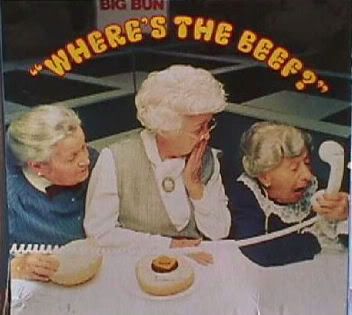(2PM EST – promoted by Nightprowlkitty)
During the 2000 debates, George W. Bush spoke at a sixth-grade level (6.7) and Al Gore at a seventh-grade level (7.6).
In the 1992 debates, Bill Clinton spoke at a seventh-grade level (7.6), while George H.W. Bush spoke at a sixth-grade level (6.8), as did H. Ross Perot (6.3).
In the debates between John F. Kennedy and Richard Nixon, the candidates spoke in language used by 10th-graders.
In the debates of Abraham Lincoln and Stephen A. Douglas the scores were respectively 11.2 and 12.0.
In short, today’s political rhetoric is designed to be comprehensible to a 10-year-old child or an adult with a sixth-grade reading level. […]
Voltaire was the most famous man of the 18th century.
Today the most famous “person” is Mickey Mouse.
America the Illiterate
Chris Hedges — Nov 10, 2008 (pg 2)
I think, I’m detecting some sort of trend here …
So it would seem, the political discourse in America is kind of on a downhill trend, wouldn’t you say. That is, if sophistication of Debate Language is any indication.
We seem to be on a downward spiral, one fueled by Republican advisers, think tank consultants, and speech-writers, in search of that “Lowest Common Denominator.” And if the rhetoric of the Health Reform national discussion, over the last year, is any guide — it seems they are already have … (hit that rock bottom that is …)
America the Illiterate
Chris Hedges — Nov 10, 2008 (pg 1)
The illiterate and semi-literate, once the campaigns are over, remain powerless. They still cannot protect their children from dysfunctional public schools. They still cannot understand predatory loan deals, the intricacies of mortgage papers, credit card agreements and equity lines of credit that drive them into foreclosures and bankruptcies. They still struggle with the most basic chores of daily life from reading instructions on medicine bottles to filling out bank forms, car loan documents and unemployment benefit and insurance papers. They watch helplessly and without comprehension as hundreds of thousands of jobs are shed.
They are hostages to brands. Brands come with images and slogans.
Images and slogans are all they understand.
[…]We live in two Americas.
One America, now the minority, functions in a print-based, literate world. It can cope with complexity and has the intellectual tools to separate illusion from truth.
The other America, which constitutes the majority, exists in a non-reality-based belief system. This America, dependent on skillfully manipulated images for information, has severed itself from the literate, print-based culture. It cannot differentiate between lies and truth. It is informed by simplistic, childish narratives and clichés.
[…]
The ability to magnify these simple and childish lies, to repeat them and have surrogates repeat them in endless loops of news cycles, gives these lies the aura of an uncontested truth. We are repeatedly fed words or phrases like yes we can, maverick, change, pro-life, hope, or war on terror.It feels good not to think. All we have to do is visualize what we want, believe in ourselves and summon those hidden inner resources […]
The upshot of all this?
When Images and Sloganeering are the Coin of the Media Realm — perhaps we should get more well-versed in How to create those Sound Bites — those ‘Word Sandwiches” that can reach that segment of population, who’s perpetually stuck in that 6th Grade conceptual world.
There, Imagery often matters more than Facts.
And Emotional Slogans stand in as the essence of the Idea, the only thing that actually sticks.
‘We got to keep Granny safe from Death Panels’, don’t ya know?
Sound bites
In film and broadcasting, a sound bite is a very short piece of a speech taken from a longer speech or an interview in which someone with authority […] says something which is considered by those who edit the speech or interview to be the most important point.
[…]
It is characterized by a short phrase or sentence that deftly captures the essence of what the speaker is trying to say.
[…]Classic examples of Sound Bites include:
Ronald Reagan’s demand that “Mr. Gorbachev, tear down this wall!”
“The only thing we have to fear is – fear itself.” (the most famous phrase in Franklin D. Roosevelt’s first Inaugural Address in 1933)
“Ask not what your country can do for you. Ask what you can do for your country.” (the most famous phrase in John F. Kennedy’s Inaugural Address in 1961)
“Read my lips: no new taxes“, delivered by United States presidential candidate George H. W. Bush
“Senator, you are no Jack Kennedy.” said by Lloyd Bentsen as a retort to Dan Quayle’s comparison of himself to Jack Kennedy in terms of political experience
“Elvis has left the building!” was an announcement often heard on the public address system after an Elvis Presley concert to disperse crowds lingering for an encore.
http://en.wikipedia.org/wiki/S…
Sound bites are the phrases that most People remember, most.
Sound bites are the “kernel of meaning” that get rewound/replayed by our push-button Media.
Sound bite ‘Editors’ are NOT looking for Collegiate Facts — BUT they ARE looking for 6th-Grade Imagery!
One Problem though — most Democratic Speakers are intent on showing off their College Educations. They mostly speak in tangles of Facts, that the few can follow, and the even fewer will remember.
Word Salads, Dry Facts, and a Stack of Statistics — may be factual True, BUT still NOT CUT through the Clutter of Misunderstanding … ravaging the heartland.

When all the while, a simple 6th-grade slogan, would have done the trick:
[One] of the most famous slogans ever created:
Where’s the beef? – Wendy’s
Slogans are memorable phrases
5 essential tips on how to write a killer slogan
1. Start From The Logo
2. Give the Project the Time It Needs
3. Keep It Simple
4. Make It Funny, If You Can
5. Stay Honest and Don’t “Trump Up” Your Product
And for a more recent example of how effective Sloganeering and Sound Bite creation can be, one needs only look to Alan Grayson — one Democratic Speaker who KNOWS HOW to Make a Point, AND how to Make it Stick!
“The Republican health care plan: don’t get sick,” he said. But, he added, “The Republicans have a back up plan in case you do get sick … This is what the Republicans want you to do.
If you get sick America, the Republican health care plan is this: Die quickly!
Wow!
If only we had a thousand more like him, Dems who can speak directly, in simple, image-filled sentences.
Sound Bites that get repeated, ad infinitum … Something’s got to fill that Media’s endless News Void.

Afterall, those endless loops of ‘Mickey Mouse’ will only go so far, in that 24/7 messaging machine!

14 comments
Skip to comment form
Author
also posted on dKos
Although, still not sure, what “Language Level” would reach the folks there …
???
I think it highly unfortunate that in our present day, we are reduced to sound bites, however, that seems to be the nature of discourse in the mainstream. I would liken it to viewing a painting by one of the Old Masters, and only being able to see a small segment of it. Obviously, the overall meaning and impact of that work of art would be lost.
Many of us may recall elders from the past who went to school through the eigth grade and no further. And this was far more recently than the days of Lincoln and Douglas. I’ve been told that the Lincoln-Douglas debates were considered major events wherever they were held and sometimes extended for as long as seven hours’ duration.
If you ever have a chance to see a stage production of playwright Robert E. Sherwood’s Abe Lincoln in Illinois, the eloquent use of the language in the Lincoln/Douglas debates, which is a significant part of the play, will astound you. The play, written in 1938, won the 1939 Pulitzer Prize for Drama, the 1994 Drama Desk Award Outstanding Play Revival, and the 1994 Tony Award for Best Revival of a Play.
As eloquent as Lincoln and Douglas were, in the present day, there is a signficant portion of our population who would likely be turned off by both of them and would instead vote for someone whose words were more easily understood. There is little that infuriates people more than to have the sense, just or unjust, that someone else is talking over the head or is talking down to them.
While spending some time in Minnesota in late October 1998, I had the chance to catch one of the debates between Norm Coleman (Republicon), Hubert H. “Skip” Humphrey III (Democratic Farmer-Labor) and Jesse Ventura (Indepedent). Coleman and Humphrey, neither whom seemed to take Ventura seriously, offered the usual doublespeak we so often hear from politicians, and Ventura spoke in a very plain, easily understandable manner such as one might expect from a well-versed neighboring farmer. Ventura surprised his two opponents, and quite likely himself in pulling off a surprise upset, becoming the 38th governor of Minnesota.
Rightly or wrongly, I would strongly suspect that when voters find that they can easily understand what someone is saying to them, they can also easily assume that the person speaking to them can understand them as well.
We all have our threshold in such matters. Although Look Homeward, Angel by Thomas Wolfe is a masterpiece, I found that it was challenging reading, including many obscure words that I’ve never encountered before or since. While I would be the first to recommend it, I do think it would represent too much work for a number of people I know. I’ve found some of William Faulkner’s work, such as Absalom! Absalom! and The Power and the Fury, to be similarly challenging, but for slightly different reasons. Due to my own personal threshold for pain, I would probably not bother to read something that was much more difficult than these works.
I would suspect that most of us, even those of us who are quite intelligent and well educated, have sat through lectures by experts that required so much energy and concentration that we eventually felt exhausted, and began to daydream. It would stand to reason the more “intelligent” a case one makes, the greater the proportion of the audience that is lost in the process.
A great trial lawyer has to have the ability to understand complex issues, but at the same time present the case to a jury which may oftentimes include people whose ability to comprehend complex issues may be limited. Perhaps for no other job, other than that of a politician, is the ability to easily “shift gears” such a vital requirement for success.
The Reich Wing has the advantage of 24/7 coverage on Faux News, as well as the MSM to keep driving home their oftentimes simplified, but erroneous points. Those who are truly progressive have very few opportunities, and when they present themselves, it is extremely important to make certain that any quotes can be easily understood.
Although Alan Grayson is undoutedly a very intelligent person, and was previously a very successful attorney, he has a gift for presenting complex ideas in a manner that can quickly and easily be understood by a wide audience, as alluded to in this essay the above essay. I do think that Dems who are truly interested in advancing progressive causes should attempt to follow his example.
I would agree that the “higher up the ladder” a politician goes with their rhetoric, more more voters are lost in the process. Those potential voters who fall by the wayside are easy pickings for someone else who comes along with a simple and oftentimes erroneous and intentionally misleading message.
There is always a well-known solution to every human problem–neat, plausible, and wrong. — H. L. Mencken, Prejudices: Second Series, 1920